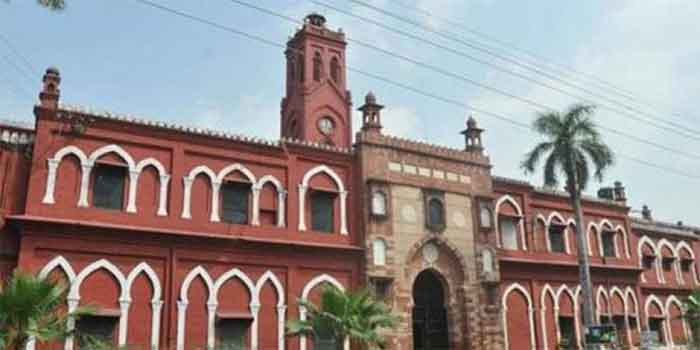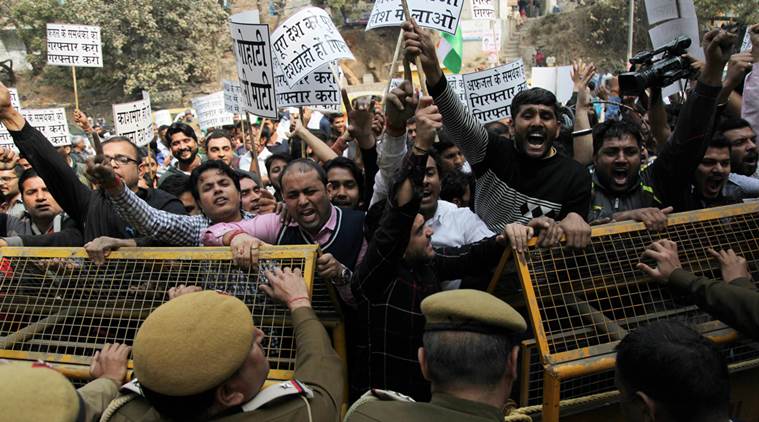Co-Written by Shamsher Alam and Mohammad Niyaz Ahmad

In common-sense perspective, students of university and college are being considered as monolithic category. The advocators of students’ politics also credence to the same thought. However, they overlook that students are not a macro unit. They are very much divided on the line of castes, class, region, ideology and most importantly religion. They also assert according to these categories. In this context, the present paper attempts to analyze the students’ politics from micro standpoint. In other words, it tries to look into the possibilities of Muslim students’ politics in the higher educational institutions.
Minority Institutions and Students’ Politics
There are two important institutions which attract Muslim students, these are Aligarh Muslim University (AMU) and Jamia Millia Islamia (JMI). Although, the former is not having the minority status, there is significant number of Muslim students in this very institution. The same is also enjoying the students’ union. Henceforth, there is chance of students’ activism. However, there is absence of party-based students’ politics unlike Jawaharlal Nehru University (JNU) and Delhi University (DU). The students and students’ leaders of AMU called themselves free from ideology. They explicitly do not adhere any party’s ideological premise. The students’ election is fought on the local issue. Student leaders try to mobilize students on the basis of region. The presence of Muslims students in AMU, led to their victory in students’ union election. However, in the name of Muslims students’ politics, there is absence of the Pasmanda Muslim discourse. This discourse never appears at the students’ political landscape.
Though, there is student union in AMU, it is not politically vibrant like JNU. The political vibrancy of this institution can also be understood with vivacity of movement for its minority status. Despite of formal and institutionalized body of students’ activism, there is lack of vigorous movement for its minority character. Time and again they have raised their voices on various issues. But they are unable to connect themselves with other progressive forces outside their campus. However, in recent time, the students’ activism gathered some momentum in the context of Citizenship (Amendment) Act (CAA). This led to arrest of ex-AMU student leader, Sharjeel Usmani.
JMI is not having students’ union election, it is banned. Although, there is lack of formal student union, the students’ activism emerged during the anti-CAA protest. The lack of institutionalized leadership was felt during the anti-CAA movement. Had there been the students’ union the movement against CAA would have been successful. There would have been vigorous protest against the arrest of many students’ leaders during the anti-CAA movement. In this way, JMI despite of being the center of Muslim students, it could not become the harbinger of institutionalized students’ politics and activism. The lack of institutional support led to the personal loss and problems for many emerging students’ leaders.
Elite Institutions and Muslim Students’ Activism
The massive presence of any community in educational institutions could strengthen their bargaining power to win the election. In this context, it is worth mentioning that the representation of Muslims in higher education is below to their percentage of population. They are 5.2 percent at higher education level, according to All India Survey on Higher Education (2018-19). Although, they are adequately represented at the minority institutions such as JMI, their underrepresentation in the other elite institutions is established by Sachar Committee Report (SCR, 2006). Their weak presence in other elite higher educational institutions led to marginalization and dependent participation in students’ politics.
In this context, it is worth discussing about the JNU, an elite institution, and Muslims students’ political participation in the same. There is a commonsensical understanding about JNU, which talks about its secular and progressive character. However, as far as the representation of Muslims students’ leaders is concerned, it is a matter of grave concern. Most of the time, Muslims students are considered as vote bank by left oriented and other political parties. Generally, Joint secretary and vice-president posts are being offered to them. They also contest election for the post of councilors in few school councillors, particularly in the School of Language, Literature & Cultural Studies (SLL&CS). Very few Muslim students are getting chance to fight election in other schools such as School of Social Sciences (SSS). The implicit reason is their low presence in these schools unlike SLL&CS.
During my stay at JNU (till now eight years), only two Muslim candidates fought for the post of president. First, Akbar Chaudhary won the election of president from left camp. Later on, a female Muslim student (Shabana Ali) also contested election (she lost) for the post of president under the banner of Birsa Ambedkar Phule Students’ Association (BAPSA) in 2017-2018. Although, Muslim students get chance to contest election on few seats, they are not adequately represented in the students’ union. Their weak presence is a stumbling block in the way of independent Muslim students’ political groups. However, in recent past, a socio-political group called ‘Fraternity Movement’ largely formed by Muslim students, fought election with BAPSA.
The situation of Muslim students’ activism in another educational institution is not different. The similar condition is also being found in other elite and so-called progressive educational institution, i.e. Tata Institute of Social Sciences (TISS), Mumbai. On the basis of my (Niyaz Ahmad, co-author) academic journey (nearly five years) at TISS, Muslim students never contested election for the post of president. Although, few Muslim students assert for adequate representation, their voices are not being heard. They are not able to fight independently nor they are getting appropriate share in the students’ politics. Their weak presence led to their political marginalization. Their active and independent participation in students’ politics is not possible because of their poor strength.
Madrasas and Students’ Activism
It is well established fact that most of the Muslim students get education in the formal and modern educational settings. However, they also go to the traditional or religious educational institutions i.e. Madrasa. Much of the discourse on madrasa education has been centered around traditional curriculum and teaching methods. However, it has rarely being discussed about the modern political thought and knowledge of the madrasa students. In other words, the presence of students’ union or such kind of platform, is not being addressed by the writers of madrasa education. Azam (a pseudo name), a student passed from madrasa and currently enrolled in JNU, argued: “one of the important differences between the madrasa and modern higher education is the students’ union”. “The modern higher education is blessed with the students’ union. This is the platform to raise the voices of students. This kind of small and symbolic but democratic institution is not there”. “The students’ union is absence in the madrasas of every sectarian understanding”. Further, he argued: “he was not aware of the term union and precisely its function”. When he arrived at the university, he got to know about the students’ union and its importance, he argued.
The lack of students’ union in religious seminaries can also be analyzed from the pedagogical and curriculum perspective. Since madrasas primarily focus on the religious education. Implicitly, these institutions are preparing the men who could serve the religion. Madrasas are also producing workforce for the religious economy, which do not require such kind of knowledge and activism. They do not intend to prepare their product for the worldly affairs, particularly for political discourse. That is why management of madrasa do not allow for such kind of political institutions. This led to the political desocialization of Madrasa students during their stay at the religious seminaries.
Common Muslim Students Reluctant to Participate in the Student Politics
In commonsense perspective, politics is not being considered as bright career option. However, the common people overlook the outreach of politics. The politics has reached on our dining table, it decides what would you eat at your dinner. However, common people are reluctant in the active participation in the politics. This kind of adherence is very much prevalent among the Muslim youth and their parents/guardians. They forbid their wards to participate in the same. The common parents/guardian argue that politics is bad thing. They advise them to maintain aloof from the politics, particularly students’ politics, otherwise, it will destroy your career. The lethargic attitude towards students’ politics can be found among Muslim students not only in the local college but also in the elite institutions like JNU.
Conclusion
Thus, it can be argued that two Muslim dominated institutions (AMU and JMI) could have harbinger of Muslims students’ politics; but the lack of vibrant activism in AMU and absence of students’ union in JMI restrict the possibilities of active and decisive Muslim students’ politics in these higher educational institutions. Moreover, there is also lack of any socio-political group of Pasmanda Muslim students in these educational institutions. The low presence of Muslims in other higher educational institutions, further devitalize the potentials of independent Muslim students’ activism or politics. The role of madrasas in political socialization of Muslim students through students’ union is not visible. The hesitant feeling of common Muslims students towards active participation in students’ politics of other higher educational institutions also curbs their independent political assertion. These led to the political marginalization of Muslims in general and Muslim youth in particular, in Indian electoral politics.
Shamsher Alam, Doctoral Candidate , Centre for the Study of Social Systems , Jawaharlal Nehru University, New Delhi
Mohammad Niyaz Ahmad, Doctoral Candidate, School of Management and Labour Studies, Tata Institute of Social Sciences, Mumbai
SIGN UP FOR COUNTERCURRENTS DAILY NEWSLETTER










































